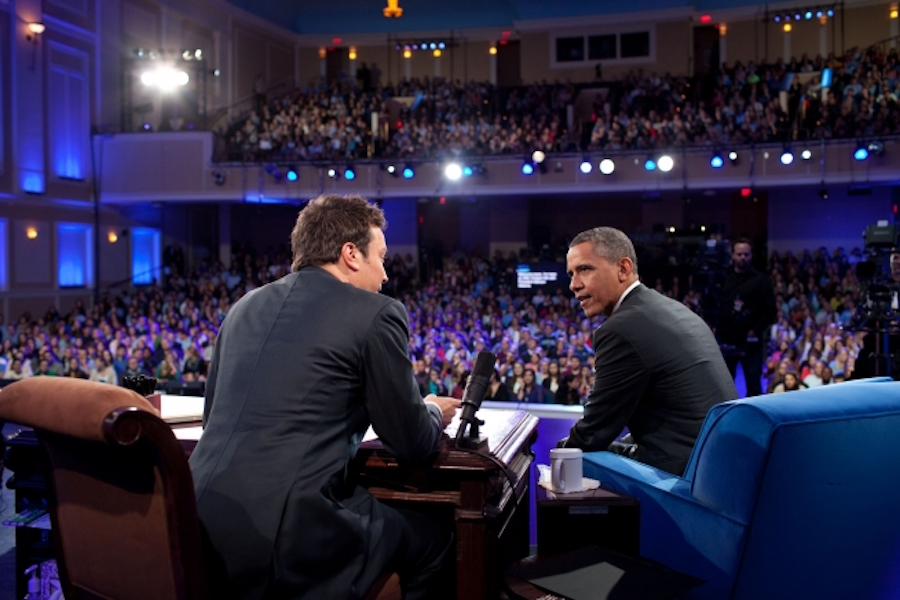
Will comedians elect the president of the United States?
Satire has been perhaps the most powerful force in this year’s election build-up. With every absurd Donald Trump remark, Hillary Clinton email and Republican candidate’s endorsement (or lack thereof), every talk show and light-night comedian has reacted with gusto.
Like Tina Fey’s celebrated impersonation on Saturday Night Live of vice-presidential nominee Sarah Palin in 2008, Darrell Hammond’s Trump impersonation has reflected the shocking absurdity of the Republican nominee. Talk show hosts Trevor Noah, John Oliver, Seth Meyers, David Letterman and Stephen Colbert have lead the political charge just like The Daily Show and The Colbert Report have in the past.
But not all comics use their platform in a responsible or effective way.
Jimmy Fallon’s recent choice to bring Donald Trump onto The Tonight Show was one of the latest examples of a non-confrontational host having an extremely controversial figure on his program. In his interview, Fallon is friendly and unassuming and offers no grilling questions. In fact, he was so friendly that the next week’s guest, Hillary Clinton, handed him a literal bag of softballs that had been left in the dressing room Trump had vacated. Fallon’s response? “I gave them to [Trump] as a gift.”
The interview prompted Full Frontal’s Samantha Bee (herself a Daily Show alum) to make the unusual move of speaking out against NBC and Fallon himself. In a recent New York Times article Bee is quoted as saying: “If he thinks that a race-baiting demagogue is O.K., that gives permission to millions of Americans to also think that.” Fallon’s choice to focus on humor in the interview as opposed to confronting serious issues with Trump’s campaign may be a recurring issue in America’s political satire.
Writer Malcolm Gladwell, known for his long career at The New Yorker and best-selling books, discusses satire in a recent podcast entitled “Revisionist History: The Satire Paradox.” He argues that much of the American brand of satire often appeals too much to the side opposite of the one that they intend to court.
Take Stephen Colbert for example. His new show has not diverged from political discourse, but the thick layer of satire that enveloped his right-wing persona has certainly lessened. Although his previous act was so well-loved, Gladwell argued that his new show is actually exceedingly more effective in accomplishing his political goals. The same jokes Colbert would make satirically about his liberal guests would appeal earnestly to conservative watchers.
In doing so, Gladwell says, Colbert created a political program that held both liberal and conservative audiences –– no small feat –– but was ultimately not effective in accomplishing his goals.
Perhaps content that spends less time being satirical and more time being articulate, which has been modeled well by The New Yorker in recent weeks, is better for American politics. In George Saunders’ semi-serious, semi-humorous article for the magazine, “Who are All These Trump Supporters?,” the Trump demographic is explored and deconstructed through genuine but often ironic interviews and interactions with supporters. Saunders notes the real tragedy that occurs when individuals across party lines miscommunicate, indulge hypocrisy and are generally immature. But he still allows humor to play a role in political discourse when he subtitles a section “A Tiny Pissed Voice Rings Out” in reference to Donald Trump’s rally diatribes.
In many ways satire is incredibly necessary to politics. It heightens the general public’s interest during election time, translates political events and mostly doesn’t let politicians get away with uncouth behavior. Comedians may play a large role in the results of the upcoming election because they are the source from which many citizens learn and think about politics.
Fallon’s choice to make his audience laugh with Trump, as opposed to reconsider him, is problematic because of Fallon’s power. Our democratic system is possible because of satire. If the public can’t criticize those in power, power can be abused. When the public cannot criticize their leaders, citizens of a democracy are unequipped to make informed voting decisions.
I don’t discredit satire for the positive role it plays in politics. However, while watching Jimmy Fallon’s interview with Donald Trump, even I, a self-proclaimed liberal, found myself smiling along with Trump every few minutes. Between Fallon’s encouraging laughter, gentle questioning and excessively subtle sarcasm, Trump seemed affable. It’s for this reason that scholars like Malcolm Gladwell and entertainers like Stephen Colbert must exist to both educate and actualize politics for the public, but also to scrutinize its players.
Written by: Stella Sappington – opinion@theaggie.org



